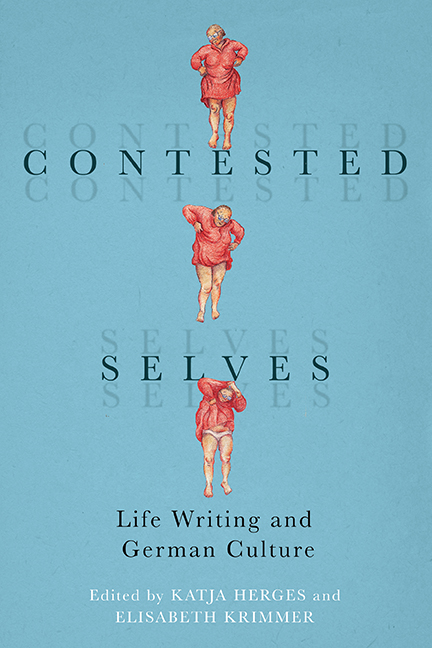Book contents
- Frontmatter
- Contents
- Acknowledgments
- Introduction
- Part I Women’s Life Writing, Female Subjectivity and Agency
- Part II Modern Life Writing and Aesthetics
- Part III Trauma and Vergangenheitsbewältigung
- Part IV Transnational and Transgenerational Life Writing in Contemporary Germany
- Bibliography
- Notes on the Contributors
- Index
3 - Writing the Cultural Memory of East Germany through Women’s Interviewliteratur
Published online by Cambridge University Press: 26 May 2022
- Frontmatter
- Contents
- Acknowledgments
- Introduction
- Part I Women’s Life Writing, Female Subjectivity and Agency
- Part II Modern Life Writing and Aesthetics
- Part III Trauma and Vergangenheitsbewältigung
- Part IV Transnational and Transgenerational Life Writing in Contemporary Germany
- Bibliography
- Notes on the Contributors
- Index
Summary
IN A CONTEXT OF strict literary censorship in East Germany (1949–89), interview literature as a form of life writing gained prominence as an acceptable expression of literary subjectivity, particularly for women. In Interviewliteratur zum Leben in der DDR (Interview Literature on Life in the GDR, 2001) Hans Joachim Schröder notes that interview subjects were generally average citizens rather than prominent figures: by capturing the Alltagsleben (everyday life) of citizens of the German Democratic Republic (GDR), interview literature contributed to the emergence of a “Geschichte von unten” (history from below). Groundbreaking works such as Sarah Kirsch's Die Pantherfrau: Fünf unfrisierte Erzählungen aus dem Kassetten-Recorder (The Panther Woman: Five Unadorned Tales from the Tape Recorder, 1973–74) and Maxie Wander's Guten Morgen, du Schöne: Protokolle nach Tonband (Good Morning, Beautiful: Tape- Recorded Interviews, 1977) provide important insight into women's lives, yet we cannot approach these texts uncritically. While East German Interviewliteratur allowed everyday women to participate in constructing the cultural memory of the GDR, it does not offer unmediated access to women's experiences. Rather, it represents a collaborative effort and serves as an authentic, multivocal, literary component of the cultural record of East Germany.
The terms “truth” and “authenticity” are often contested in the field of life writing and autobiographical genres, and this tension is amplified when the genre involves collaboration, as is the case here. In calling these texts “authentic,” I suggest that the interview subjects speak about their personal experiences in their own voices, even if their stories are then mediated by the authors. Neither Kirsch nor Wander invented or fictionalized these narratives but, rather, used them to convey real-life experiences of women in the GDR to broad audiences across time and place. Such texts, then, are simultaneously autobiographical in that the subjects speak about themselves as an “I” and biographical in that another author then shapes the narratives into a structured text to be published. Regarding the concepts of life narrative and autobiographical truth, Sidonie Smith and Julia Watson assert, “Autobiographical truth resides in the intersubjective exchange between narrator and reader aimed at producing a shared understanding of the meaning of a life.” In this case the narratives carry the imprint of Kirsch's and Wander's crafting, while the “truth” lies in the multivocal experiences that women share.
- Type
- Chapter
- Information
- Contested SelvesLife Writing and German Culture, pp. 73 - 92Publisher: Boydell & BrewerPrint publication year: 2021



